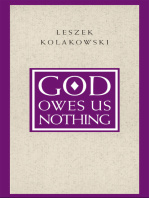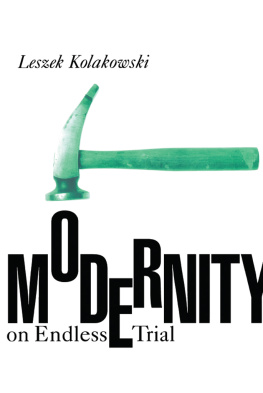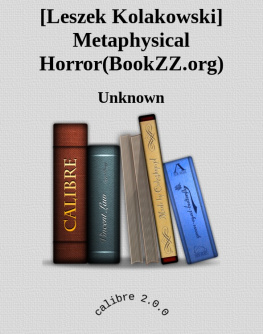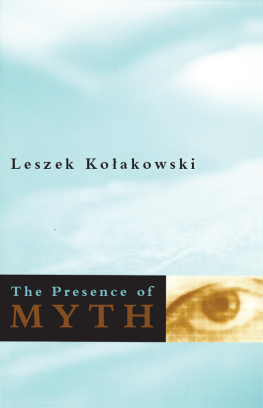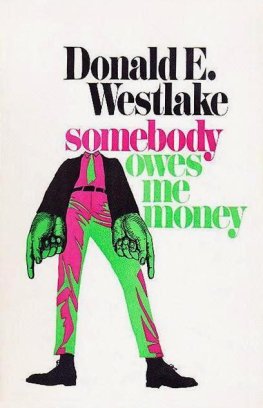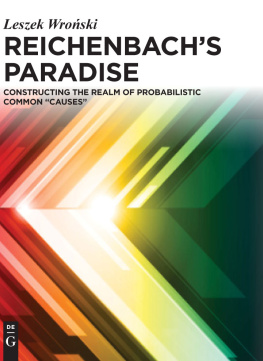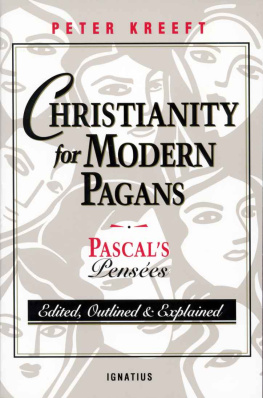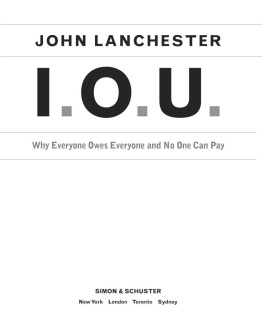Leszek Kolakowski - God Owes Us Nothing: A Brief Remark on Pascals Religion and on the Spirit of Jansenism
Here you can read online Leszek Kolakowski - God Owes Us Nothing: A Brief Remark on Pascals Religion and on the Spirit of Jansenism full text of the book (entire story) in english for free. Download pdf and epub, get meaning, cover and reviews about this ebook. genre: Religion. Description of the work, (preface) as well as reviews are available. Best literature library LitArk.com created for fans of good reading and offers a wide selection of genres:
Romance novel
Science fiction
Adventure
Detective
Science
History
Home and family
Prose
Art
Politics
Computer
Non-fiction
Religion
Business
Children
Humor
Choose a favorite category and find really read worthwhile books. Enjoy immersion in the world of imagination, feel the emotions of the characters or learn something new for yourself, make an fascinating discovery.
- Book:God Owes Us Nothing: A Brief Remark on Pascals Religion and on the Spirit of Jansenism
- Author:
- Genre:
- Rating:3 / 5
- Favourites:Add to favourites
- Your mark:
- 60
- 1
- 2
- 3
- 4
- 5
God Owes Us Nothing: A Brief Remark on Pascals Religion and on the Spirit of Jansenism: summary, description and annotation
We offer to read an annotation, description, summary or preface (depends on what the author of the book "God Owes Us Nothing: A Brief Remark on Pascals Religion and on the Spirit of Jansenism" wrote himself). If you haven't found the necessary information about the book — write in the comments, we will try to find it.
God Owes Us Nothing: A Brief Remark on Pascals Religion and on the Spirit of Jansenism — read online for free the complete book (whole text) full work
Below is the text of the book, divided by pages. System saving the place of the last page read, allows you to conveniently read the book "God Owes Us Nothing: A Brief Remark on Pascals Religion and on the Spirit of Jansenism" online for free, without having to search again every time where you left off. Put a bookmark, and you can go to the page where you finished reading at any time.
Font size:
Interval:
Bookmark:
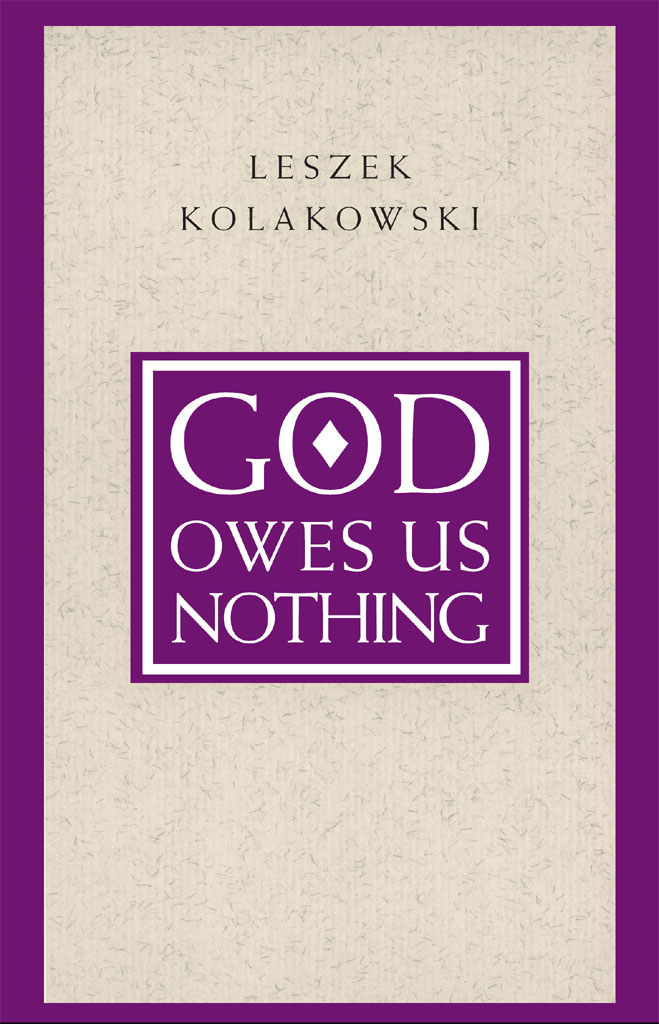
The University of Chicago Press, Chicago 60637
The University of Chicago Press, Ltd., London
1995 by The University of Chicago
All rights reserved. Published 1995
Paperback edition 1998
Printed in the United States of America
04 03 02 01 00 99 98 2 3 4 5
ISBN 978-0-226-18949-9 (ebook)
ISBN: 0226450511 (cloth)
ISBN: 0226450538 (paperback)
Library of Congress Cataloging-in-Publication Data
Kolakowski, Leszek.
God owes us nothing: a brief remark on Pascals religion and on the spirit of Jansenism / Leszek Kolakowski.
p. cm.
Includes bibliographical references and index.
1. Pascal, Blaise, 16231662. 2. Augustine, Saint, Bishop of HippoInfluence. 3. Jansenists. 4. Semi-Pelagianism. 5. Catholic ChurchDoctrinesHistory17th century. I. Title.
B1903.K57 1995
273'.7dc20
95-5768
 The paper used in this publication meets the minimum requirements of the American National Standard for Information SciencesPermanence of Paper for Printed Library Materials, ANSI Z39.481992.
The paper used in this publication meets the minimum requirements of the American National Standard for Information SciencesPermanence of Paper for Printed Library Materials, ANSI Z39.481992.
LESZEK KOLAKOWSKI
GOD OWES US NOTHING
A Brief Remark on Pascals Religion and on the Spirit of Jansenism
THE UNIVERSITY OF CHICAGO PRESS
CHICAGO AND LONDON
I am greatly indebted to my daughter Agnieszka; not only did she polish my incurably imperfect English but she made very many useful corrections in the text of this book. Her work was most helpful.
Does it make sense to write about Pascal after all the outstanding scholars of our century, after Brunschvicg, Strowski, Lafuma, Gouhier, Mesnard, to name only a few? The doubt is irresistible, but we can quote Bouilliers History of Cartesian Philosophy: what can one say about Pascal that has not been perfectly said by Mr. Cousin in his two admirable prefaces and by Mr. Havet in his study and commentary to the Penses? Bouillers book was published in 1854, and since then an enormous number of works, both historical and interpretative, have been produced. The question, therefore, seems even more pertinent. On the other hand, great philosophers are, as it were, everybodys property. One may think and write about Spinoza after von Dunin-Borkowski and Gebhardt, on Aquinas after Gilson and Manser, etc. This kind of work never stops. Not because one discovers new texts or new biographical details; on these points the contribution of the scholars just mentioned is invaluable and perhaps definitive. Even though a slight probability still exists that some new documents will surface, it is most unlikely that they might revolutionize our knowledge. But the work never stops because nearly every generation has a Plato, a Kant, a Pascal of its own. Those wells of wisdom never dry up.
The present book is no more than a gloss, and it hardly needs mentioning that it deals only with some chapters of Pascals legacy; as Pascal said, there is a meaning which makes the entire work of an author consistent, and it is the search for this meaning that induces us to reflect. We should admit, however, that this search is inescapably tainted by our attempt to find in it a major concept that we can apply to the experience of our own time.
The Jansenist context of Pascals thinking can never be left aside; but it is no less obvious that to explain him by, or to reduce him to, this context would make of his work a footnote to a theological squabble which, important though it was in the seventeenth century, might seem only of historical interest. Jansenism attracted a number of eminent scholarsfrom Sainte-Beuve to the late Jean Orcibaland I have nothing to add in historical matters. My purpose was to understand Jansenism both as a theological school that tried to cope with some of the insoluble mysteries of Christianity and as a reactionary model of Christian faith and life, a desperate attempt to ward off the grim menace of the burgeoning Enlightenment; I wanted to reflect on the meaning that unites its two sides. A few basic historical facts are briefly mentioned to make my essay more readable. Most of the comments on the secondary literature are relegated to notes in order to avoid unnecessary interruptions.
The present authors sympathies and antipathies are divided when he reflects on the conflict between Jesuit modernizers and Jansenist reactionaries. So miserable is human destiny that the lights which deliver man from one evil throw him into another (Pierre Bayle).
PART ONE
We are going to talk about what is perhaps the most formidable and intractable puzzle of Christian thinkingthe confrontation of divine grace with the human free willnot in order to depict its centuries-long and very confusing history or, God forbid, to contribute to its solution, but to see how this puzzle became the focus of a struggle between modernity and reaction embodied respectively in Jesuit and Jansenist doctrines in the seventeenth century, how Saint Augustine became a victim of this battle, and what role was played in it by Pascal.
Grace: internal, external, habitual, sufficient, efficient, justifying, actual, prevenient, sanctifying, incongruous, perfect, imperfect, preparatory, stimulating (excitans), irresistible, versatile, equilibrated;
Grace: of adoption, of regeneration, of inhabitation, of sanity, of medicine.
This is a list, by no means exhaustive, of adjectives and nouns employed in sixteenth- and seventeenth-century theological polemics to single out various kinds or various sides of divine grace. At first glance the list may look terrifying and suggest an extremely intricate battlefield which requires an enormous effort and erudition to be properly understood. In reality, while the controversy about grace was indeed obscured by a huge number of distinctionsinvented for defensive or offensive purposes but adding little or nothing to the substance of the debatethe core of the problem was fairly simple (insofar as anything is simple in theology), and it is not very hard to grasp. Since, however, we are dealing with the problem of grace in the context of Jansenist-Jesuit strife, it seems reasonable first to state it as it was actually stated and phrased in this very context, and only later to reduce it to the basics, to skim over rapidly the antecedents of the quarrel and to try to reflect upon its meaning in the vicissitudes of the Counter-Reformation.
Within two centuries of the beginning of the Great Reformation, the Catholic Church issued a number of official doctrinal documents dealing, among other things, with the questions of divine grace, predestination, free choice, and the role of human will in peoples salvation or damnation. The most important are: the bull Exsurge Domine (1520) condemning 41 heretical or scandalous propositions of Martin Luther; the decrees of the fifth and sixth sessions of the Council of Trent (1547); the bull Ex Omnibus Afflictionibus (1567) condemning 79 statements by Michael Baius; the bull Cum Occasione (1653) condemning 5 statements attributed to Cornelius Jansenius; and the constitution Unigenitus (1713) condemning 101 propositions of Pasquier Quesnel. The number of books devoted to the subject is immense; this was the core of the theological debate, the question par excellence which more than anything elsein theological termsseparated all churches, sects, and schools in Europe from each other. Lutherans and Calvinists, Arminians and Gomarists, Jansenists, Jesuits, Thomistsall defined their doctrinal stance first by giving their own interpretation of the canonical texts, in particular Pauls letter to the Romans: do we human creatures contribute in any way to our salvation and, if so, in what way? In no other concept are all the crucial aspects of Christian faith so concentrated as in that of grace: original sin, redemption, salvation, God the merciful, God the avenger.
Next pageFont size:
Interval:
Bookmark:
Similar books «God Owes Us Nothing: A Brief Remark on Pascals Religion and on the Spirit of Jansenism»
Look at similar books to God Owes Us Nothing: A Brief Remark on Pascals Religion and on the Spirit of Jansenism. We have selected literature similar in name and meaning in the hope of providing readers with more options to find new, interesting, not yet read works.
Discussion, reviews of the book God Owes Us Nothing: A Brief Remark on Pascals Religion and on the Spirit of Jansenism and just readers' own opinions. Leave your comments, write what you think about the work, its meaning or the main characters. Specify what exactly you liked and what you didn't like, and why you think so.

